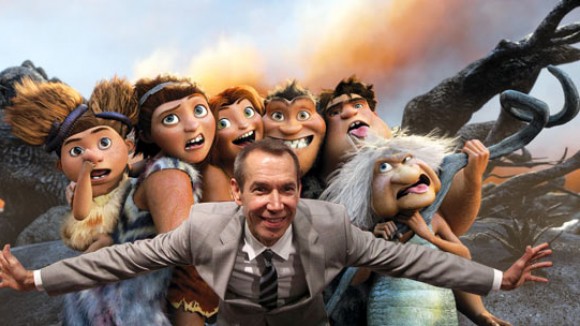

Jeff Koons Loves “Croods”

Disney’s Frozen has gained momentum in the last two months as the leading cotender for the feature animation Oscar, picking up nearly every possible recognition and endorsement, but the DreamWorks sleeper hit The Croods boasts one endorsement that no other film can claim: a glowing essay by art world superstar Jeff Koons. Koons, whose “Balloon Dog (Orange)” sculpture sold at auction a few months ago for $58.4 million (an all-time high for a living artist), was recently introduced to the film by Harvey Weinstein.
 Koons was so enamored with the Chris Sanders and Kirk DeMicco-directed pic that he sent an email, through Weintein, to DreamWorks Animation chief exec Jeffrey Katzenberg. The Wall Street Journal acquired a copy of Koons’ letter, in which he praised the film’s meaning “based on the philosophy of Plato’s Cave, of freeing oneself from the darkness and following the light to transcendence,” and admired its artistry, including the “sense of physicality and density” and the use of lighting to represent possibilities.
Koons was so enamored with the Chris Sanders and Kirk DeMicco-directed pic that he sent an email, through Weintein, to DreamWorks Animation chief exec Jeffrey Katzenberg. The Wall Street Journal acquired a copy of Koons’ letter, in which he praised the film’s meaning “based on the philosophy of Plato’s Cave, of freeing oneself from the darkness and following the light to transcendence,” and admired its artistry, including the “sense of physicality and density” and the use of lighting to represent possibilities.
Could Koons’ affection for The Croods perhaps lead to an eventual collaboration with DreamWorks? It’s not out of the question, especially considering that Koons has made millions incorporating classic cartoon characters like Popeye and Pink Panther into his sculptures.
Here is the full text of Koons’ letter:
Over the holiday season, I took my family of eight to see The Croods, which is a wonderful film about the life-changing journey of the first family on Earth. Being on a family road trip ourselves, we could immediately immerse ourselves in the odyssey of this primitive family. What really struck me about this film was this sense of time, how the past and present were woven together so that it connects to human history and the possibilities of our future. It deals with what it feels like to be human, to experience family, community and the possibility of life’s experience. The film is based on the philosophy of Plato’s Cave, of freeing oneself from the darkness and following the light to transcendence.
As survival is the only priority for the Croods, they confine themselves in a cave at night where the father hones their survival instincts by telling stories about how curiosity and newness always end in death. The cave is dark, and their teenage daughter’s curiosity leads them on an adventure. The whole family is forced to address their fears and eventually learn that curiosity and ingenuity are not only necessary for survival, but that ideas lead to enlightenment and to transcendence.
It seems that the prehistoric world that the Croods live in is not so different from today. They experience the same fears and the same family pressures. And Chris Sanders and Kirk DeMicco added a fair amount of present day references for good measure: conch shell cellphone, clay and stone camera, sports, fashion. Past and present are constantly interwoven.
There is something that is very familiar but very strange conveyed in the animation. There’s a sense of physicality and density that reinforces this sense that ideas come about through gut intuition and feelings. Visually, the film is stunning with rich colors and texture. Light is both an abstract idea but it has an impressive visual presence in the film. At every suspenseful turn in the film, there is light on the horizon that guides the family on. Light represents possibilities.
The imagination of The Croods lies both in the mastery of animation and the spirit of humanity found within the story. The film emulates our world as it deals with the human condition and a realization that it’s not just about survival but transcendence. After emerging from the darkness of the cave, the Croods learn to face their fears, and after initial reluctance, accept the guidance of an orphan boy. The guidance allows the family to draw upon his leadership and learn from their new experiences. It’s human nature to strive for and find a greater purpose in life. As the Croods begin to grasp the power of ideas and analyze their own existence, they move from contemplating the present to the universe and beyond. As their experiences become richer, they begin to understand that there is a human responsibility, not just to one’s self and family, but to one’s community. It’s a beautiful moment of enlightenment as the family experiences this growth and evolution. I walked out of the theater feeling that my family and I could feel a greater connection to what it means to be human and to face the challenges that we confront in being part of the ongoing story.
–Jeff Koons
